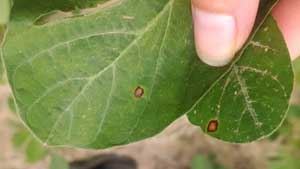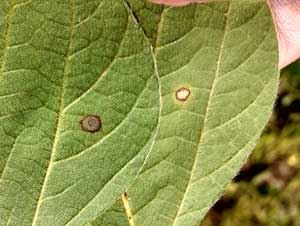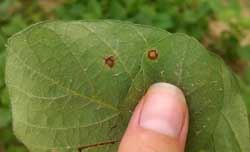Distinguishing Frogeye Leaf Spot From Chemical Injury In Soybean
DR. HEATHER YOUNG KELLY
JACKSON, TENN.
Frogeye leaf spot (FLS) has begun to show up in susceptible varieties in Tennessee, but there is also some chemical burn in soybean that can be mistaken for FLS.
From the top side of the leaves the chemical burn and FLS can look near identical (Picture 1), with a dark margin and lighter center. Although, chemical burn will usually be close to a perfect circle and FLS may be more angular in shape. The lower sides of the leaves are best area to distinguish the two (Picture 2 and 3). Chemical burn will have a bleached out center (lesions on the right) whereas FLS will have a tan to grayish center and if the lesion is sporulating, in the very center of the lesion there will be a dark black area (lesions on the left).

Picture 1- Top side of leaves: frogeye leaf spot (FLS)
on left and chemical burn on right

Picture 2- Bottom side of leaves: frogeye leaf spot (FLS)
on left and chemical burn on right

Picture 3- Bottom side of leaves: frogeye leaf spot (FLS)
on left and chemical burn on right
If you do find FLS in your soybean field and would like to have it tested for fungicide resistance free testing is being conducted this year to determine if Frogeye Leaf Spot disease in a field is caused by QoI/Strobilurin fungicide resistant strain of C. sojina. To have a sample tested please send at least 20 symptomatic leaves with sporulating lesions and a sampling form filled out to:
WTREC, Lab C
605 Airways Blvd.
Jackson, TN 38301
Attn: Frogeye Leaf Spot Samples
Leaves with FLS symptoms should be placed in a sealable plastic bag and mailed overnight or as soon as possible. Leaves should be kept in a cool, dark place until mailed. More information and pictures of Frogeye Leaf Spot and how to sample can be found at UTCrops.com (Frogeye Leaf Spot Information and Directions for Frogeye Leaf Spot Samples). If you have any questions contact Heather Kelly (731-425-4713 or youngkelly@utk.edu). ∆
DR. HEATHER YOUNG KELLY: Extension Plant Pathologist, University of Tennessee